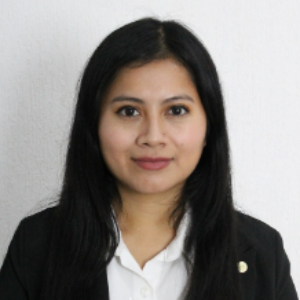Title : Injectable hydrogels as drug delivery systems for cancer treatment.
Abstract:
Cancer is one of the leading causes of death in the world, their treatment includes a combination of
surgery, chemotherapy, and radiotherapy. Unfortunately, this combination is limited due to the
heterogeneous manifestations of the disease, dose-related toxicity, and side effects. A promising strategy to
limit the adverse effects of these treatments is the implementation of a targeted therapy through the use of
injectable hydrogels, which provide localized sustained release of the chemotherapeutic. They reduce the
toxicity in non-tumoral tissues, by avoiding systemic circulation of the chemotherapeutics. Recently, their
use has been proposed for hepatic, gastric, and bladder carcinoma. Additionally it had been used for the
treatment of melanoma, glioblastoma and subcutaneous tumors. Although proofs of concept and in-vitro
trials about delivery, toxicity and effectiveness show encouraging results, there also exists a lot of
experimental evidence needed before its clinical implementation.
The injectable hydrogels are characterized by perform a sol-gel transition in-situ by chemical,
physical and radiation crosslinking methods. This transition is associated as a response to some stimuli such
as temperature, pH and UV-light. Thermosensitive hydrogels the most investigated, due to its convenient
and easy application, since they are injected in liquid state and gelificate around the target tissue at body
temperature. In addition, it has been proved that depending on the material used, both hydrophobic and
hydrophilic drugs, can be encapsulated and release in a controlled manner. Which provides a large number
of options of molecules to be used and even allows the combination of drugs, which has been proven to
increase the effectiveness of chemotherapy
Nowadays different polymers such as polyethylene glycol (PEG), Polylactic Acid (PLA),
polylactic-co-glycolic acid (PLGA), Polyvinyl alcohol (PVA) and Pluronic F127 has been explored alone
and in conjunction with other materials such as micelles and liposomes, in order to obtain formulations
increasingly stable and durable. However, since that main in-vivo model consists of ectopic tumors in
rodents, it makes it difficult to measure the specific response because of the absence of a tumor-specific
microenvironment. Therefore, testing injectable hydrogels in conditions similar to those to which they will
be subjected is one of the main highlights in their development. In our research we had synthesized
injectable hydrogels composed of PVA and PF127 and we had studied the change in gelation and
degradation time according to the process of synthesis and percentage of compounds used. Also the
injectable hydrogels have been subjected to different simulation’s media in order to evaluate their delivery
and degradation under extreme and physiological conditions. Until now, although the results are promising
it is still necessary to extend the period of degradation as well as improve the delivery dosage in order to
accomplish with the appropriate standards so, the injectable hydrogel became a competitive alternative of
cancer treatment.
What will audience learn from your presentation?
? The importance of injectable hydrogels as emerging drug delivery system in cancer treatment.
? Injectable hydrogels main characteristics, their advantages and challenge to solve
? The main polymers and methods used for the synthesis of injectable hydrogels


